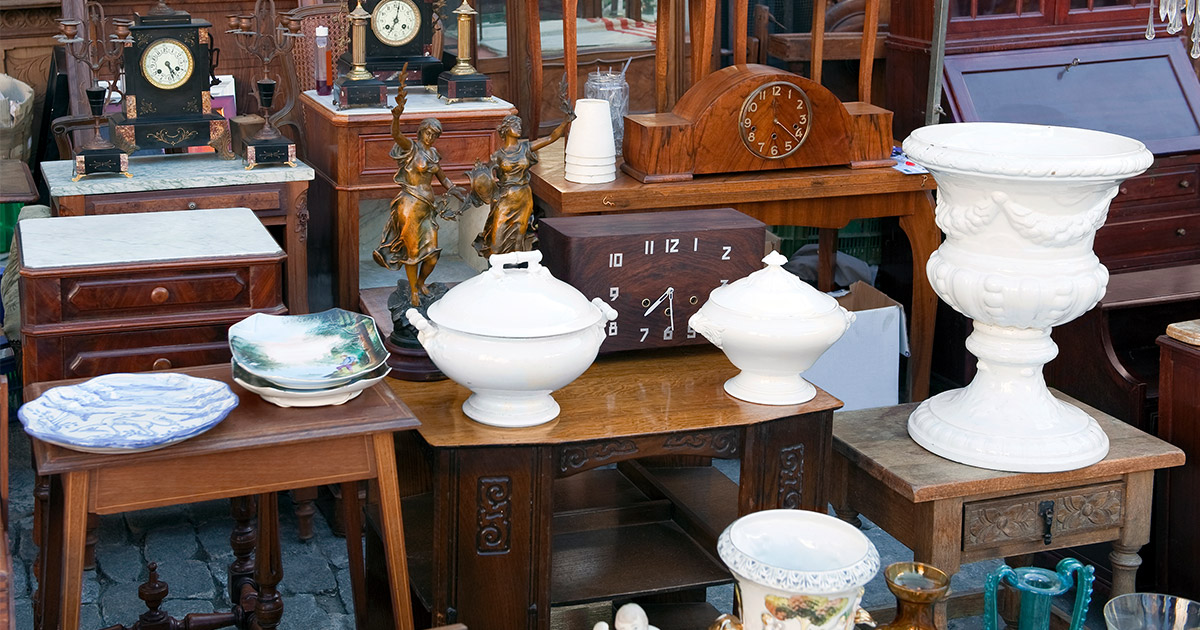When a loved one like a parent or grandparent passes away, they usually leave behind much more than their legacy and memories. Their homes (and in many cases, storage units) are often filled with stuff they’ve accumulated over the years their kids or relatives just don’t need or want.
The reason for the downturn in hand-me-downs? Beginning in the 2000s, clutter was out and minimalism was in. Plus, millennials are less inclined to want their parents’ household goods simply because they have no place to put them. (1)
Take a closer look at executor duties.
Honestly, it’s both an honor and a burden to be entrusted with someone’s estate. But what happens if you were named the executor of the estate for a parent who has passed away? What exactly are you supposed to do with all his or her possessions — from a big tube TV and a set of encyclopedias to a mahogany bedroom set and a beige recliner?
An executor of an estate is a person named in a will charged with protecting a deceased person's property until all debts and taxes have been paid, and seeing that what's left is transferred to the people who are entitled to it under the terms of the will. The term “personal representative” is used in some states.
Essentially, if there is no will or no executor has been named in the will, the probate court appoints a person called the estate administrator. He or she is tasked with ensuring the deceased person's property is distributed according to that person's wishes — if there is a will — or according to state law if there is no will.
What do I do with all my parents’ stuff?
As part of your estate administrative duties, let’s say that you and other relatives have spent countless hours sifting through your loved one’s belongings, deciding amongst yourselves which items you’d like to keep. But you are left with several items (some smaller, such as clothing and personal belongings, and some larger, such as furniture or appliances) on your hands. It brings up several lingering logistical and financial questions to consider, such as:
Can I sell what’s left of my parent’s estate? Yes — if the property is not specifically designated to someone in the will or in a valid personal property designation form. The executor or administrator should sell the property for its fair market value. Proceeds from the sale must first be used to pay priority claims such as:
-
Taxes.
-
Court costs.
-
Funeral expenses.
-
Administrator or executor fees.
-
Attorney fees and accounting fees.
Any money left is then used to pay other debts of the deceased person. Finally, any remaining proceeds are distributed to the beneficiaries in the will or the heirs under state law if there is no will.
How do I sell what’s left of my parents’ estate? How you sell these belongings depends on the amount of time and effort you can commit to preparing the items for sale, advertising their availability and managing the transactions. Another factor is how much you are willing to negotiate with potential buyers. Fortunately, you have many options when it comes to selling the estate assets, including:
-
Hold an auction.
-
Have a garage sale.
-
Post items on an internet site (such as eBay, Craigslist or oodle).
-
Use traditional advertising methods, such as newspapers, bulletin boards or word of mouth.
How to hold an estate sale
Another way to unload these items is to have an estate sale. You can work with an estate sale company who can conduct a multi-day sale and do everything from managing the details of the initial evaluation of your items to writing you a check when the sale has been completed.
An estate liquidator service can expedite the process selling estate assets. In most cases, they will come to the home and give you a dollar amount to take all of the personal belongings for a flat fee that is paid up front.
Ron Anderson, an ARAG Network Attorney who has extensive experience helping members plan their estates, points out, “It’s important to remember that the executor or administrator is under a duty to obtain as much as possible for the estate assets so as to protect the creditors and beneficiaries of the estate.”
He adds, “It’s also very important for the administrator or executor to keep accurate records of the sales and donations, as you’ll have to report to the court (and sometimes to creditors or beneficiaries) if you are challenged how you have handled the assets.”
Should I donate, give away or throw out the rest of my parents’ stuff? The best-case scenario when you have miscellaneous items on your hands is to find a good home for them versus simply tossing in a dumpster. Again, this may take additional time and effort, but at least they won’t end up needlessly clogging up a landfill. Here are some alternatives to pitching:
-
Donate: Find a local charity, nonprofit organization or thrift store that takes gently used items such as clothing, housewares and toys. Keep in mind, items that have been recalled, banned or do not meet current safety standards may not be accepted. Additionally, you may want to call your local charity (e.g., Salvation Army, Goodwill®, Habitat for Humanity® Restore) to see if certain items like mattresses or computers will be accepted. On the other hand, if you have items with historic or cultural significance, consider donating them to a local or larger historical society or museum.
Also note that if you donate items to a state- or federal-approved charity this may provide some tax deductions, but as the executor or administrator, you should consult with a tax advisor.
-
Recycle: Recycling electronic items such as appliances, computers and TVs can be a worthwhile endeavor to help reduce “e-waste.” Check with your local waste authority for their guidelines on recycling. Some retailers like Best Buy® will accept a wide range of electronics, appliances, computers and DVDs. Utility companies across the country, such as MidAmerican Energy and Southern California Edison®. offer their customers rebates for donating older appliances. If you are having trouble finding an entity that will recycle your electronic goods or appliances, several manufacturers offer takeback programs. (2)
-
Repurpose: Sites like Pinterest® or Hometalk® can offer a ton of ideas to help you turn leftover, outdated household items into something creative and useful, like making that rickety wooden ladder into a cool bookcase — or fashioning a trendy little purse out of an old book. With a little imagination, almost anything can serve a new purpose to someone.
Start the de-cluttering discussions now.
How can you avoid these headaches of deciding what to do with all of these leftover possessions?
-
First, it’s a good idea to start the discussion about your loved ones’ wishes — and the sorting of their items — while they are in a sound frame of mind. That way you can start the process with their input and direction, and not work in a confusing, time-consuming vacuum after they’re gone.
-
Second, having the correct — and up-to-date — estate planning documents in place is a must. For example, your loved one should make a valid will and a valid personal property designation document in which he or she can clearly make their wishes known regarding such personal property.
Anderson suggests that proper estate planning with regularly updated wills, personal property designations forms, powers of attorney, trusts, living wills and beneficiary designations are a true gift that parents can leave behind. "These efforts will make your lives easier after they’re gone, because their exact wishes will be carried out, which helps avoid nasty family conflicts.
Another benefit of making sure your parents are proactive? According to Anderson, “Proper planning can also help lower or avoid probate costs (which involve the legal process of proving the will is valid) and preserve more assets for the beneficiaries."



